外研版(2019)必修 第一册Unit 6 At one with nature Grammar 课件(共36张PPT)
文档属性
| 名称 | 外研版(2019)必修 第一册Unit 6 At one with nature Grammar 课件(共36张PPT) |
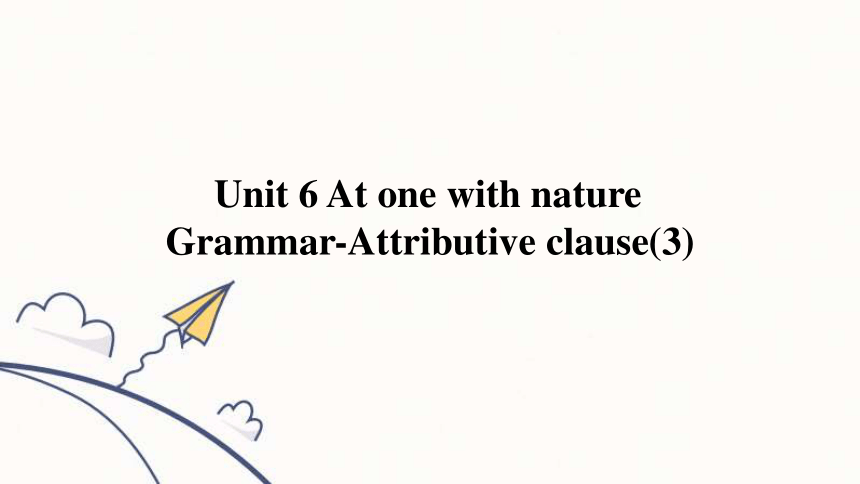
|
|
| 格式 | pptx | ||
| 文件大小 | 7.7MB | ||
| 资源类型 | 教案 | ||
| 版本资源 | 外研版(2019) | ||
| 科目 | 英语 | ||
| 更新时间 | 2024-10-19 15:30:21 | ||
图片预览

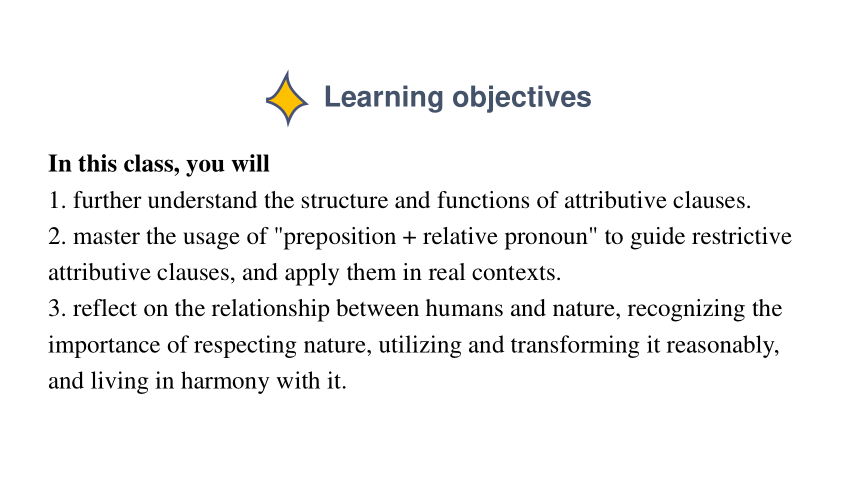
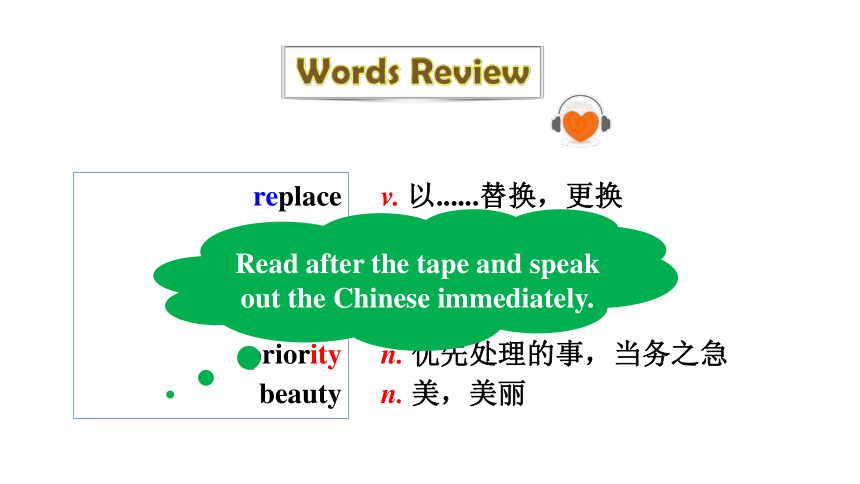
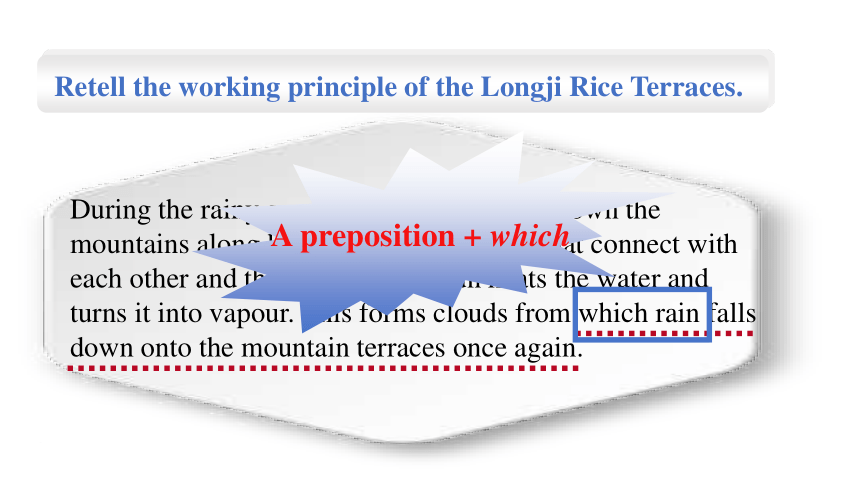
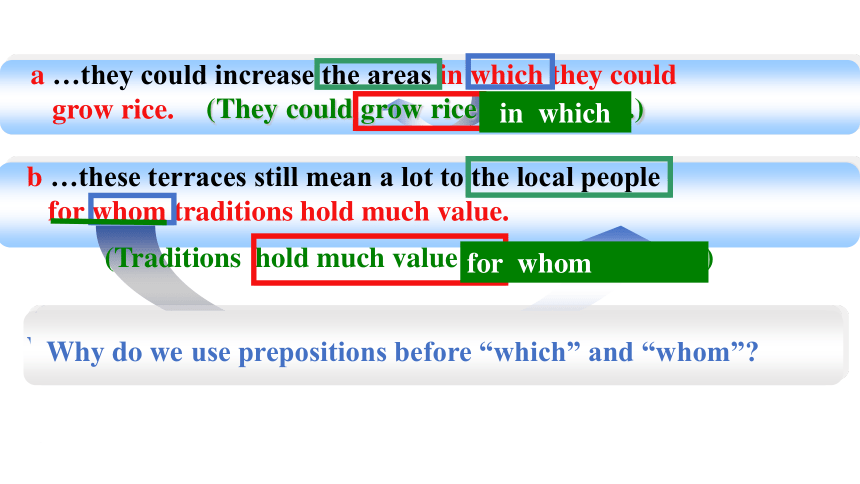
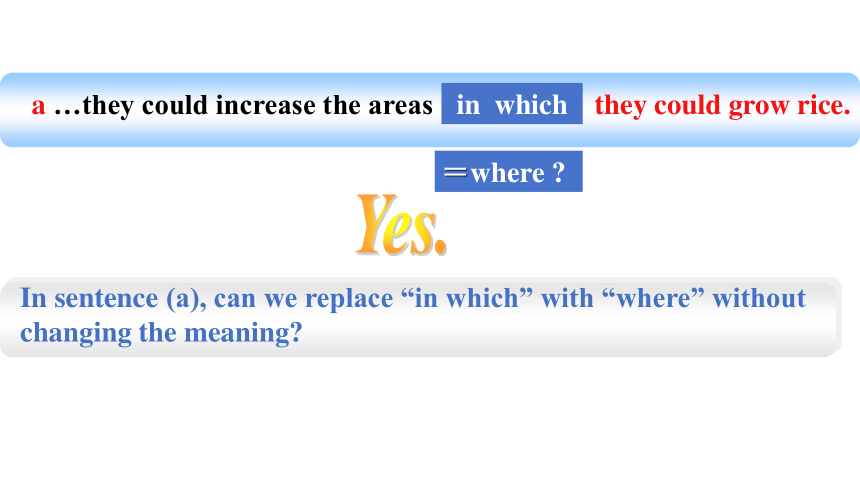
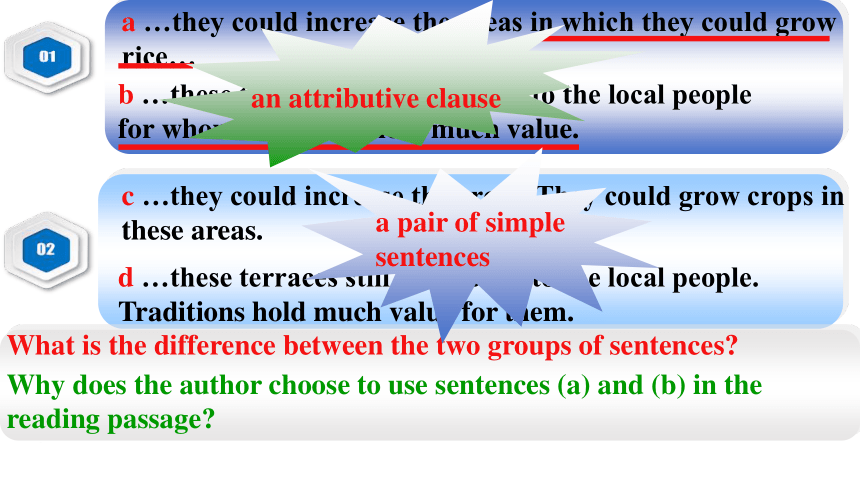
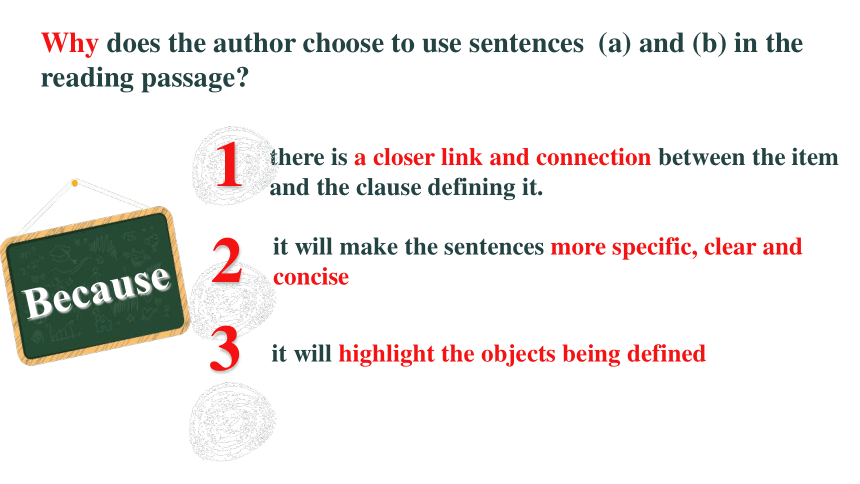

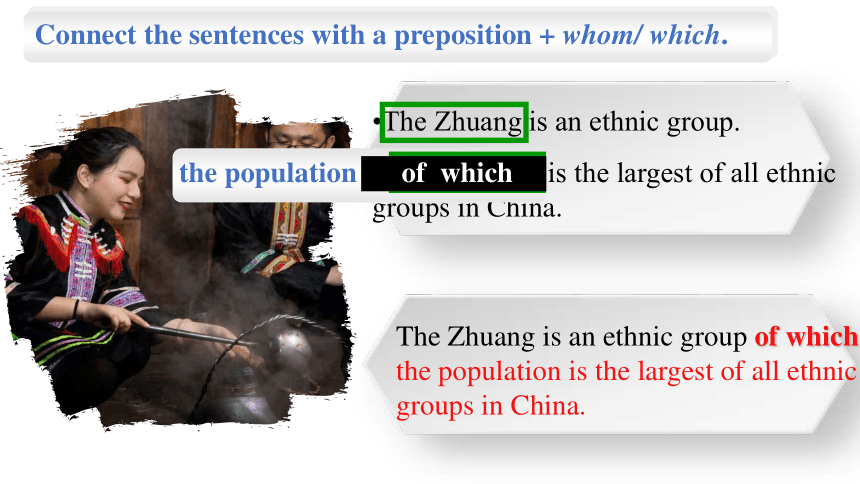
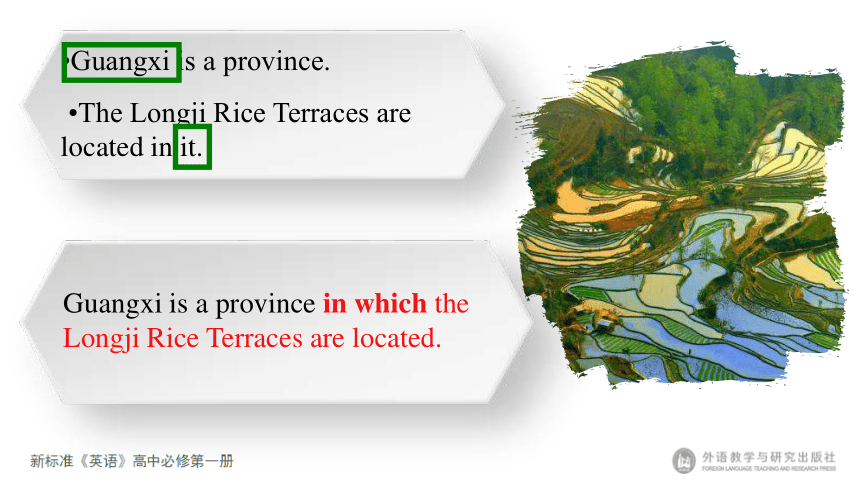
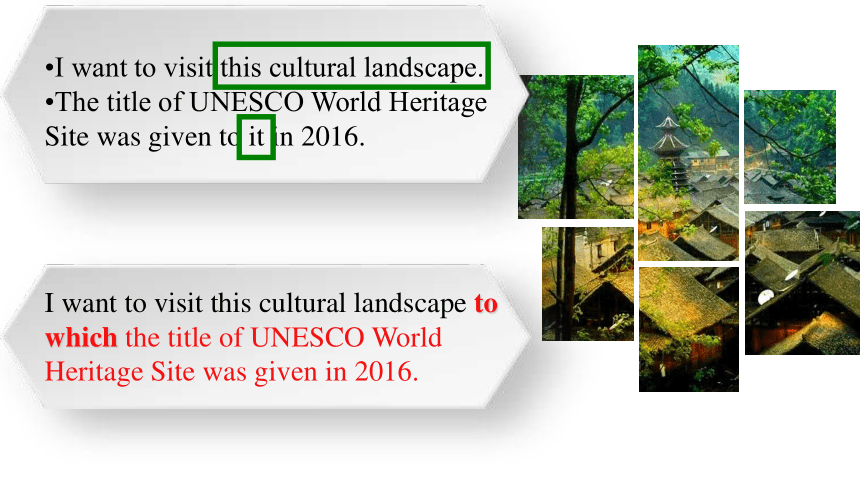
文档简介
(共36张PPT)
Unit 6 At one with nature
Grammar-Attributive clause(3)
In this class, you will
1. further understand the structure and functions of attributive clauses.
2. master the usage of "preposition + relative pronoun" to guide restrictive attributive clauses, and apply them in real contexts.
3. reflect on the relationship between humans and nature, recognizing the importance of respecting nature, utilizing and transforming it reasonably, and living in harmony with it.
Learning objectives
replace
material
mineral
consumer
priority
beauty
v. 以......替换,更换
n. 材料
n. 矿物,矿产
n. 消费者
n. 优先处理的事,当务之急
n. 美,美丽
Read after the tape and speak out the Chinese immediately.
Retell the working principle of the Longji Rice Terraces.
During the rainy season, rainwater moves down the mountains along hundreds of waterways that connect with each other and the terraces. The sun heats the water and turns it into vapour. This forms clouds from which rain falls down onto the mountain terraces once again.
A preposition + which
Why did the local people build terraces
Why do the local people still keep their traditional way of
growing rice
b …these terraces still mean a lot to the local people
for whom traditions hold much value.
a …they could increase the areas in which they could
grow rice.
What do “which” and “whom” refer to in each sentence
Why do we use prepositions before “which” and “whom”
(They could grow rice in the areas.)
in which
(Traditions hold much value for the local people.)
for whom
a …they could increase the areas in which they could grow rice.
In sentence (a), can we replace “in which” with “where” without changing the meaning
in which
=where
Yes.
a …they could increase the areas in which they could grow rice…
b …these terraces still mean a lot to the local people for whom traditions hold much value.
c …they could increase the areas. They could grow crops in
these areas.
d …these terraces still mean a lot to the local people. Traditions hold much value for them.
What is the difference between the two groups of sentences
an attributive clause
a pair of simple sentences
Why does the author choose to use sentences (a) and (b) in the reading passage
Because
there is a closer link and connection between the item and the clause defining it.
it will make the sentences more specific, clear and concise.
it will highlight the objects being defined.
1
2
3
Why does the author choose to use sentences (a) and (b) in the reading passage
… what is most significant is the way in which people have worked in harmony with nature to make these terraces and grow rice.
This forms clouds from which rain falls down onto the mountain terraces once again .
Look for more sentences with attributive clauses in the reading passage.
Connect the sentences with a preposition + whom/ which.
The Zhuang is an ethnic group.
Its population is the largest of all ethnic groups in China.
The Zhuang is an ethnic group of which the population is the largest of all ethnic groups in China.
the population of the Zhuang
of which
Guangxi is a province.
The Longji Rice Terraces are located in it.
Guangxi is a province in which the Longji Rice Terraces are located.
I want to visit this cultural landscape.
The title of UNESCO World Heritage Site was given to it in 2016.
I want to visit this cultural landscape to which the title of UNESCO World Heritage Site was given in 2016.
He is expert on rice planting. The local Zhuang people have learnt a lot from him.
He is an expert on rice planting from whom the local Zhuang people have learnt a lot.
定语从句 Ⅲ
在限制性定语从句中,除了用常见的关系代词或关系副词来引导定语从句外,有时也会使用
“介词+关系代词”来引导定语从句。
Focus on
基本含义和用法
This road will take me to the place ____ which I belong.
根据大意,从句意为“我属于的地方”。根据短语“belong to”可知空格处应填 to。
to
确定介词原则二:
根据从句动词、形容词等构成的短语确定所需介词。
Jack is the very person _________ I will turn when in trouble.
据题干大意,从句意为“我遇到困难可以求助的人”。“求助”即“turn to”,又因先行词指人,故答案为 “to whom”。
to whom
The song often takes me back to the day when the accident happened.
The song often takes me back to the day _____ which the accident happened.
据第一句可知,第二句中which用来指先行词“the day”,在从句中意为“在这天”,故填介词“on”。
确定介词原则三:
根据先行词确定所需介词。
on
此时“介词+关系代词”结构往往可以和
关系副词互换。如:
when=表时间的介词(in, at, during等)+which
where =表地点的介词(in, at, on, under等) +which;
why=表原因的介词 for+ which
1. I met the child (whom) I looked after ten years ago.
我遇到了十年前我照料过的那个孩子。
2. This is the pen (that/which) you are looking for.
这是你正在找的钢笔。
含有介词的动词固定短语在定语从句中一般不拆开,在这种情况下,介词仍然放在后面,如 hear from,look after, look for等。
注意:
实战高考
William Hastie once suggested that history informs us past mistakes _________ we can learn without repeating them. [2021年天津卷笔试第一次]
A. from which B. in which
C. with whom D. for whom
1. 单选
实战高考
① This special building is a place ____ ______ theatre is made and ________ children, artists, writers and anyone else have the opportunity (机会) to do creative things. [2022 全国甲卷 阅读理解 A篇]
这座特殊的建筑是一个建造剧院的地方,孩子、艺术家、
作家和其他任何人都有机会在这里做创造性的事情。
in which
where
2. 根据句意填空。
实战高考
② It is our hope that in coming decades, advances in science will offer new perspectives (视角) _____ _____ to study how people manage their lives. [2021 新高考Ⅰ卷 阅读理解 D篇]
我们希望在未来几十年里,科学的进步将提供新的视角来研究人们如何管理自己的生活。
from which
实战高考
③ He likes that he can sit and check his phone in peace or chat up the barkeeper ____ _______ he’s on a first-name basis if he wants to have a little interaction. [2019 课标全国卷Ⅰ阅读理解 C篇]
with whom
他喜欢坐着安静地看手机,或者在他想说话的时候,就和他能直呼其名的服务生聊上几句。
3. 试翻译:
To explain this phenomenon, the researchers explored the degree to which a good performance by a team requires its members to coordinate(协调)their actions. (2019北京卷七选五)
为了解释这一现象,研究人员探究了一场好的比赛要求队员们在多大程度上相互配合。
“介词+关系代词”引导的定语从句
介词的确定:
1. 由主从句的句意决定;
2. 由从句动词、形容词等构成的固定短语确定;
3. 根据先行词确定所需介词。
结构:
介词+which(指物); 介词+whom(指人)
Where do natural dyes come from
Why are natural dyes popular
Nature-plants, insects, sea creatures and mineral compounds.
The colours are brighter and can be kept longer for artists and craftspeople.
By using natural dyes, we can remind ourselves of nature’s beauty and protect the natural world.
Among the many beautiful treasures people can receive from nature are natural dyes. The most common natural source 1 natural dyes come is plants. Materials for making natural dyes can often be found in gardens
2 colourful flowers are planted. Other natural dyes are made from insects, sea creatures and mineral compounds.
from which
in which
Natural dyes are now returning to popularity, especially with artists and craftspeople. The reasons 3 they prefer natural dyes are that the colours are brighter and can be kept longer. Natural dyes are also becoming more popular with consumers 4 caring for the environment is a priority. More and more people feel that by
using natural dyes, we can remind ourselves of nature’s beauty and protect the natural world.
for which
for whom
Does it only protect nature
Does it protect our health,
when we wear clothes
dyed with natural dyes
What is good to nature is good to ourselves.
1. He is my favourite teacher. I can’t understand the reason __________ you don’t like him.
2. Miss Yang is a famous writer __________ a lot of teenagers have great respect.
3. It was raining heavily that day __________ they met for the first time.
4. Mr Smith was the first person __________ Nancy communicated when she arrived in Europe.
5. There are many countries in Asia, __________ China is the largest one.
Ⅰ. 用适当的关系代词填空,必要时加介词。
for which
for whom
on which
with whom
of which
Exercise
6. Do you like the book ________________ she learned a lot
7. The tower ___________ people can have a good view is on the hill.
8. The man __________ you are going to make friends is my father’s neighbour.
9. Do you know the reason ___________ he got angry
10. - Can you believe I had to pay 30 dollars for a haircut
- You should try the barber’s ________ I go. It’s only 15.
about/from which
from which
with whom
for which
to which
1. I can’t remember the time. I first met Nelson Mandela at the time.
2. Mary went to the university. Her father studied in the university.
3. No one told me the reason. Jackson suddenly moved to Canada for this reason.
II. 用定语从句改写句子。
I can’t remember the time when /at which I first met Nelson Mandela.
Mary went to the university where / in which her father studied.
No one told me the reason why / for which Jackson suddenly moved to Canada.
4. The high school was not very large. His mother worked in it ten years ago.
5. Professor Yang is my teacher. I have learned a lot from him.
The high school where / in which his mother worked ten years ago was not very large.
Professor Yang is my teacher that / whom / who I have learned a lot from.
Professor Yang is my teacher from whom I have learned a lot.
III. 用“prep. + which引导定语从句”结构将下列句子翻译
成英语。
1. 将和我一道旅行的那位朋友对中国的传统建筑感兴趣。
________________________________________
________________________________________
2.他们以马铃薯为食的原因是该地区不适合种植水稻。
________________________________________
________________________________________
The friend with whom I will travel is interested in Chinese traditional buildings.
The reason for which they feed on potatoes is that
the area is not fit to grow rice.
3. 昨天我们参加了一个讲座,从中我们已经了解到很多关于保护大自然的知识。
________________________________________
________________________________________
4. 我非常敬重的那位教授将会发表一篇关于茶文化的论文。 ________________________________________
________________________________________
5.当时人们对消防人员控制火情的速度感到非常惊讶。
________________________________________
________________________________________
The friend with whom I will travel is interested
in Chinese traditional buildings.
The professor for whom I have the greatest respect
will publish a paper about tea culture.
At that time, people were surprised by the speed at which firefighters brought the fire under control.
Can you use the Attributive Clauses
(preposition +which/whom) correctly
各个击破
Self-evaluation
Try to search for the information about the following pictures and then describe the following pictures in several attributive clauses with a preposition before the relative pronoun.
Homework
Unit 6 At one with nature
Grammar-Attributive clause(3)
In this class, you will
1. further understand the structure and functions of attributive clauses.
2. master the usage of "preposition + relative pronoun" to guide restrictive attributive clauses, and apply them in real contexts.
3. reflect on the relationship between humans and nature, recognizing the importance of respecting nature, utilizing and transforming it reasonably, and living in harmony with it.
Learning objectives
replace
material
mineral
consumer
priority
beauty
v. 以......替换,更换
n. 材料
n. 矿物,矿产
n. 消费者
n. 优先处理的事,当务之急
n. 美,美丽
Read after the tape and speak out the Chinese immediately.
Retell the working principle of the Longji Rice Terraces.
During the rainy season, rainwater moves down the mountains along hundreds of waterways that connect with each other and the terraces. The sun heats the water and turns it into vapour. This forms clouds from which rain falls down onto the mountain terraces once again.
A preposition + which
Why did the local people build terraces
Why do the local people still keep their traditional way of
growing rice
b …these terraces still mean a lot to the local people
for whom traditions hold much value.
a …they could increase the areas in which they could
grow rice.
What do “which” and “whom” refer to in each sentence
Why do we use prepositions before “which” and “whom”
(They could grow rice in the areas.)
in which
(Traditions hold much value for the local people.)
for whom
a …they could increase the areas in which they could grow rice.
In sentence (a), can we replace “in which” with “where” without changing the meaning
in which
=where
Yes.
a …they could increase the areas in which they could grow rice…
b …these terraces still mean a lot to the local people for whom traditions hold much value.
c …they could increase the areas. They could grow crops in
these areas.
d …these terraces still mean a lot to the local people. Traditions hold much value for them.
What is the difference between the two groups of sentences
an attributive clause
a pair of simple sentences
Why does the author choose to use sentences (a) and (b) in the reading passage
Because
there is a closer link and connection between the item and the clause defining it.
it will make the sentences more specific, clear and concise.
it will highlight the objects being defined.
1
2
3
Why does the author choose to use sentences (a) and (b) in the reading passage
… what is most significant is the way in which people have worked in harmony with nature to make these terraces and grow rice.
This forms clouds from which rain falls down onto the mountain terraces once again .
Look for more sentences with attributive clauses in the reading passage.
Connect the sentences with a preposition + whom/ which.
The Zhuang is an ethnic group.
Its population is the largest of all ethnic groups in China.
The Zhuang is an ethnic group of which the population is the largest of all ethnic groups in China.
the population of the Zhuang
of which
Guangxi is a province.
The Longji Rice Terraces are located in it.
Guangxi is a province in which the Longji Rice Terraces are located.
I want to visit this cultural landscape.
The title of UNESCO World Heritage Site was given to it in 2016.
I want to visit this cultural landscape to which the title of UNESCO World Heritage Site was given in 2016.
He is expert on rice planting. The local Zhuang people have learnt a lot from him.
He is an expert on rice planting from whom the local Zhuang people have learnt a lot.
定语从句 Ⅲ
在限制性定语从句中,除了用常见的关系代词或关系副词来引导定语从句外,有时也会使用
“介词+关系代词”来引导定语从句。
Focus on
基本含义和用法
This road will take me to the place ____ which I belong.
根据大意,从句意为“我属于的地方”。根据短语“belong to”可知空格处应填 to。
to
确定介词原则二:
根据从句动词、形容词等构成的短语确定所需介词。
Jack is the very person _________ I will turn when in trouble.
据题干大意,从句意为“我遇到困难可以求助的人”。“求助”即“turn to”,又因先行词指人,故答案为 “to whom”。
to whom
The song often takes me back to the day when the accident happened.
The song often takes me back to the day _____ which the accident happened.
据第一句可知,第二句中which用来指先行词“the day”,在从句中意为“在这天”,故填介词“on”。
确定介词原则三:
根据先行词确定所需介词。
on
此时“介词+关系代词”结构往往可以和
关系副词互换。如:
when=表时间的介词(in, at, during等)+which
where =表地点的介词(in, at, on, under等) +which;
why=表原因的介词 for+ which
1. I met the child (whom) I looked after ten years ago.
我遇到了十年前我照料过的那个孩子。
2. This is the pen (that/which) you are looking for.
这是你正在找的钢笔。
含有介词的动词固定短语在定语从句中一般不拆开,在这种情况下,介词仍然放在后面,如 hear from,look after, look for等。
注意:
实战高考
William Hastie once suggested that history informs us past mistakes _________ we can learn without repeating them. [2021年天津卷笔试第一次]
A. from which B. in which
C. with whom D. for whom
1. 单选
实战高考
① This special building is a place ____ ______ theatre is made and ________ children, artists, writers and anyone else have the opportunity (机会) to do creative things. [2022 全国甲卷 阅读理解 A篇]
这座特殊的建筑是一个建造剧院的地方,孩子、艺术家、
作家和其他任何人都有机会在这里做创造性的事情。
in which
where
2. 根据句意填空。
实战高考
② It is our hope that in coming decades, advances in science will offer new perspectives (视角) _____ _____ to study how people manage their lives. [2021 新高考Ⅰ卷 阅读理解 D篇]
我们希望在未来几十年里,科学的进步将提供新的视角来研究人们如何管理自己的生活。
from which
实战高考
③ He likes that he can sit and check his phone in peace or chat up the barkeeper ____ _______ he’s on a first-name basis if he wants to have a little interaction. [2019 课标全国卷Ⅰ阅读理解 C篇]
with whom
他喜欢坐着安静地看手机,或者在他想说话的时候,就和他能直呼其名的服务生聊上几句。
3. 试翻译:
To explain this phenomenon, the researchers explored the degree to which a good performance by a team requires its members to coordinate(协调)their actions. (2019北京卷七选五)
为了解释这一现象,研究人员探究了一场好的比赛要求队员们在多大程度上相互配合。
“介词+关系代词”引导的定语从句
介词的确定:
1. 由主从句的句意决定;
2. 由从句动词、形容词等构成的固定短语确定;
3. 根据先行词确定所需介词。
结构:
介词+which(指物); 介词+whom(指人)
Where do natural dyes come from
Why are natural dyes popular
Nature-plants, insects, sea creatures and mineral compounds.
The colours are brighter and can be kept longer for artists and craftspeople.
By using natural dyes, we can remind ourselves of nature’s beauty and protect the natural world.
Among the many beautiful treasures people can receive from nature are natural dyes. The most common natural source 1 natural dyes come is plants. Materials for making natural dyes can often be found in gardens
2 colourful flowers are planted. Other natural dyes are made from insects, sea creatures and mineral compounds.
from which
in which
Natural dyes are now returning to popularity, especially with artists and craftspeople. The reasons 3 they prefer natural dyes are that the colours are brighter and can be kept longer. Natural dyes are also becoming more popular with consumers 4 caring for the environment is a priority. More and more people feel that by
using natural dyes, we can remind ourselves of nature’s beauty and protect the natural world.
for which
for whom
Does it only protect nature
Does it protect our health,
when we wear clothes
dyed with natural dyes
What is good to nature is good to ourselves.
1. He is my favourite teacher. I can’t understand the reason __________ you don’t like him.
2. Miss Yang is a famous writer __________ a lot of teenagers have great respect.
3. It was raining heavily that day __________ they met for the first time.
4. Mr Smith was the first person __________ Nancy communicated when she arrived in Europe.
5. There are many countries in Asia, __________ China is the largest one.
Ⅰ. 用适当的关系代词填空,必要时加介词。
for which
for whom
on which
with whom
of which
Exercise
6. Do you like the book ________________ she learned a lot
7. The tower ___________ people can have a good view is on the hill.
8. The man __________ you are going to make friends is my father’s neighbour.
9. Do you know the reason ___________ he got angry
10. - Can you believe I had to pay 30 dollars for a haircut
- You should try the barber’s ________ I go. It’s only 15.
about/from which
from which
with whom
for which
to which
1. I can’t remember the time. I first met Nelson Mandela at the time.
2. Mary went to the university. Her father studied in the university.
3. No one told me the reason. Jackson suddenly moved to Canada for this reason.
II. 用定语从句改写句子。
I can’t remember the time when /at which I first met Nelson Mandela.
Mary went to the university where / in which her father studied.
No one told me the reason why / for which Jackson suddenly moved to Canada.
4. The high school was not very large. His mother worked in it ten years ago.
5. Professor Yang is my teacher. I have learned a lot from him.
The high school where / in which his mother worked ten years ago was not very large.
Professor Yang is my teacher that / whom / who I have learned a lot from.
Professor Yang is my teacher from whom I have learned a lot.
III. 用“prep. + which引导定语从句”结构将下列句子翻译
成英语。
1. 将和我一道旅行的那位朋友对中国的传统建筑感兴趣。
________________________________________
________________________________________
2.他们以马铃薯为食的原因是该地区不适合种植水稻。
________________________________________
________________________________________
The friend with whom I will travel is interested in Chinese traditional buildings.
The reason for which they feed on potatoes is that
the area is not fit to grow rice.
3. 昨天我们参加了一个讲座,从中我们已经了解到很多关于保护大自然的知识。
________________________________________
________________________________________
4. 我非常敬重的那位教授将会发表一篇关于茶文化的论文。 ________________________________________
________________________________________
5.当时人们对消防人员控制火情的速度感到非常惊讶。
________________________________________
________________________________________
The friend with whom I will travel is interested
in Chinese traditional buildings.
The professor for whom I have the greatest respect
will publish a paper about tea culture.
At that time, people were surprised by the speed at which firefighters brought the fire under control.
Can you use the Attributive Clauses
(preposition +which/whom) correctly
各个击破
Self-evaluation
Try to search for the information about the following pictures and then describe the following pictures in several attributive clauses with a preposition before the relative pronoun.
Homework
